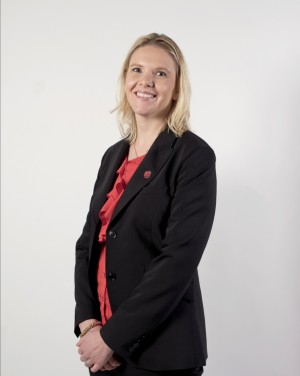Norway’s new government minister in charge of agriculture and food claims that her most important job is to clear the way for better selection and lower prices in Norwegian grocery stores. Sylvi Listhaug repeated this week that she’s intent on riding out a storm of criticism around her appointment as minister, and that she’ll work first and foremost for Norwegian consumers, not just for farmers and their powerful cooperatives.

“My job is to modernize and simplify Norwegian agriculture,” Listhaug repeated this week after recent meetings with the farmers’ organizations, members of a new food industry lobbying group and, on Monday, the leaders of Norway’s major grocery store chains. They tend to blame one another for Norway’s high food prices, and Listhaug wants all of them to be more open to competition in the otherwise small and protected Norwegian market.
“I think we compete hard every day,” Tommy Korneliussen, who heads the highly profitable wholesale and retail grocery firm NorgesGruppen, told newspaper Dagens Næringsliv (DN) after Listhaug’s latest meeting on Monday with representatives of the grocery chains. In addition to NorgesGruppen, which dominates the market in Norway through its operations of such chains as Meny and Kiwi, executives from REMA 1000, Coop and ICA were seated around Listhaug’s table. Together they control around 96 percent of the retail food market in Norway.
Others disagree that there’s adequate competition at a time when a small Norwegian lammestek (lamb roast), for example, costs around NOK 400 (USD 60-70) at almost all the stores, and the price of milk and butter is fairly standard, and rising, as well. Listhaug said she asked the retailers “what they can do to bring down food prices here in this country” and “how they can contribute to a better selection” on their shelves.
Ole Robert Reitan, of the now-wealthy family that founded the REMA 1000 discount chain, noted that “when I grew up, REMA supermakets had 1,000 items. Now we have 4,500.” Selection in Norwegian grocery stores has indeed improved dramatically in the past 20 years, but it still lags behind what’s available in other countries and prices remain much higher. Listhaug is on a mission to make changes at all levels of the food chain in Norway.

The prospect of such changes has made her a threat to those benefiting from the systems she wants to modernize, from tariff protection to subsidies and strict regulation of agricultural property and production. Listhaug is also the first agricultural minister who doesn’t come directly from farming interests, even though she grew up on a farm. Her zeal for reform has been met with defensiveness among major industry players, while criticism has reached fever pitch in the media over her brief stint in the public relations business after she’d represented her party (the Progress Party, Fremskrittspartiet Frp) in top city government in Oslo. She has refused to make public the list of clients she served for the high-profile PR firm First House, because she signed a contract ensuring their confidentiality, leading opposition politicians and some media to call her “arrogant” and worse.
One of her former clients at First House, Reitan’s REMA 1000 chain, confirmed itself that they’d consulted her on the effect of the government’s platform that may allow stores to open on Sundays, before she was named as agriculture minister. That’s set off claims of potential conflicts of interest, although her ministry’s legal staff has a list of her clients and can evaluate whether conflicts may arise. On Tuesday, the ministry sent a letter to First House, asking if they would essentially release Listhaug from her confidentiality contract or ask their clients if their identities can be released, given the demands for openness from opposition politicians and media.
Support to be found
Listhaug has her supporters, from shipowner Herbjørn Hansson who wrote in DN on Tuesday that Listhaug can make her mark on “arch-conservative agricultural policies that haven’t worked for decades.” Reitan, who doesn’t relish the prospect of new demands on his own grocery store business or its further consolidation, told newspaper Dagsavisen that “it’s about time” Norway gets a new agriculture minister “who has a different view on what have been established truths among very many of the recent agriculture ministers.”
While there’s been lots of controversy over whether Listhaug may have a conflict of interest because of her work for him, there’s rarely if ever been controversy over all the former agriculture ministers in Norway who have had farms of their own or worked directly for the farmers’ lobbying organizations. The Center Party’s Terje Riis-Johansen, for example, came directly from the board of farmers’ organization Norges Bondelag, while Listhaug’s predecessor, Trygve Slagsvold Vedum, has a farm and was a member of both Norges Bondelag and Norway’s forest landowners’ group Norges Skogeierforbund. A justice ministry review found no conflicts of interest in either case, suggesting that Listhaug’s brief work for REMA 1000 shouldn’t pose conflicts, either.
‘Exciting’
Listhaug mostly just wants to get down to work, asking the farmers, the food industry producers and the retailers how laws and rules can be changed to make the entire branch more efficient and usher in better selection and lower prices. She wants input on some of Norway’s special taxes on some food products, the country’s high tariffs on imports and how to streamline the value chain from farmer to industry to retailer.
“I think it’s exciting how she sees potential for modernizing the whole food system,” Bjørn Takle-Friis of ICA Norge told newspaper Aftenposten. Others, from the farmers’ lobby to Korneliussen of NorgesGruppen, said they were glad to be invited to meetings and be heard so quickly after she took over last week. “We feel more involved,” said Korneliussen.
Listhaug also has repeated that the new conservative government wants to reverse the new tariffs placed on meat and cheese last year that have restricted imports and raised prices for Norwegian farmers. “I want to do what’s right for consumers,” Listhaug said late last week, while members of the fishing industry want the tariffs lowered to reduce the risk that the EU will retaliate by putting higher tolls of their own on seafood imports. Others want to either keep the high tariffs in place, now that some of the noise around them has quieted down, or reverse them only if Norway gets something in return from the EU.
newsinenglish.no/Nina Berglund

